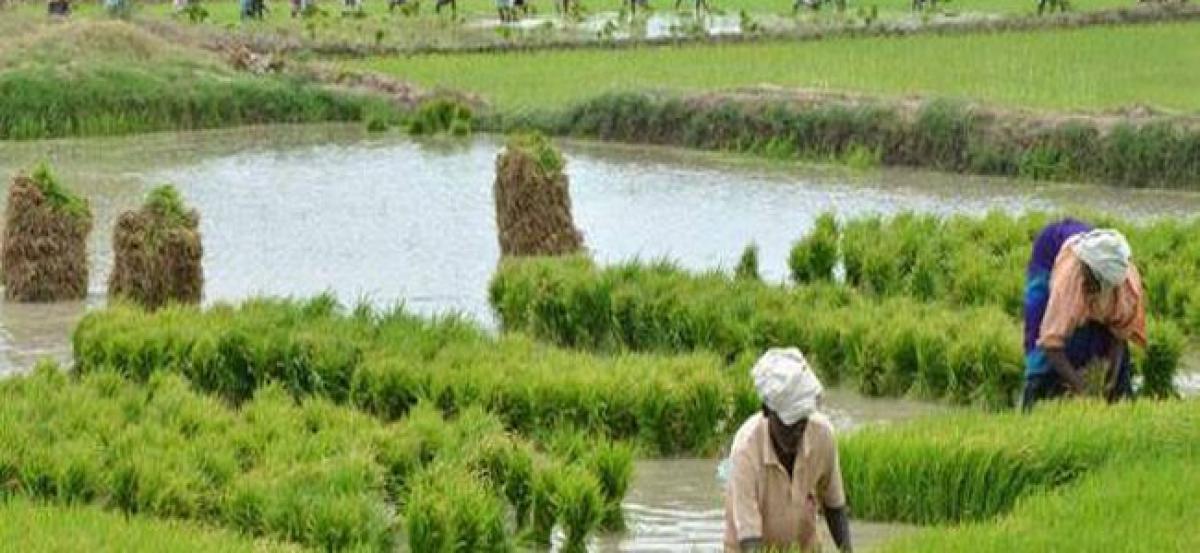Live
- Heavy snow forecast in Japan through Tuesday
- Legendary film-maker Shyam Benegal is no more
- Hackers steal over $12.7 billion in over 1,000 crypto heists to date
- BGT: 'Rohit is short of confidence with self-doubts', opines Manjrekar
- Gold gains 30 pc in 2024, silver 35 pc up on COMEX this year: MOFSL
- Delhi HC dismisses anticipatory bail plea of ex-IAS trainee officer Puja Khedkar
- Untouched Goa Beaches You Must Visit in January
- Muzigal launches its State-of-the-art Music Academy in Nallagandla, Hyderabad
- Thoughtful Christmas Gifts for Every Loved One
- South Korea: Finance minister silent on martial law probe amid speculation on acting president's role
Just In

The Union cabinet meeting which was held to decide on Minimum Support Price (MSP) hike of paddy, kharif crops on Wednesday, has decided to double the MSP for paddy more than double of what it was last year. The proposed hike is estimated to cost the taxpayers a whopping amount of Rs 15,000 crore annually.
The proposed hike is estimated to cost the taxpayers a whopping amount of Rs 15,000 crore annually.
New Delhi: The Union cabinet meeting which was held to decide on Minimum Support Price (MSP) hike of paddy, kharif crops on Wednesday, has decided to double the MSP for paddy more than double of what it was last year. The proposed hike is estimated to cost the taxpayers a whopping amount of Rs 15,000 crore annually.
The decision, taken by the Union Cabinet headed by Prime Minister Narendra Modi, comes less than a year before next general election.
While the BJP had promised in 2014 to give farmers a price of 1.5 times of cost, an announcement to give effect to the promise was made in the government's fifth and final annual Budget presented on February 1 this year.
The Cabinet Committee on Economic Affairs (CCEA) at its meeting today approved the MSP of 14 Kharif (summer-sown) crops. According to sources, the MSP of paddy (common grade) has been increased by Rs 200 to Rs 1,750 per quintal, while that of Grade A variety by Rs 160 per quintal to Rs 1,750.
The MSP of paddy (common) was Rs 1,550 per quintal and Rs 1,590 per quintal for paddy (grade A) variety. The MSP of cotton (medium staple) has been increased to Rs 5,150 from Rs 4,020 and that of cotton (long staple) to Rs 5,450 from 4,320 per quintal.
In pulses, tur MSP has been raised to Rs 5,675 per quintal from Rs 5,450, and that of moong to Rs 6,975 per quintal from Rs 5,575. Urad MSP has been hiked to Rs 5,600 from Rs 5,400 per quintal. Hike in paddy MSP will increase the food subsidy bill by over Rs 11,000 crore based on procurement figure of the 2016-17 marketing year (October-September).
The Food Corporation of India (FCI), the government's nodal agency for procurement and distribution of foodgrains, buys wheat and rice from farmers at MSP and supply the grains under the food security law. Paddy is the main kharif (summer sown) crop, the sowing of which has already begun with the onset of southwest monsoon.
Earlier, sources had said that the MSP rate proposed by the agriculture ministry is higher than the government's farm advisory body CACP, considering growing farm distress because of fall in prices of most crops, owing to bumper production.
India is estimated to have harvested a record foodgrains production at 279.51 million tonnes in the 2017-18 crop year (July-June) on all-time high output of rice, wheat, coarse cereals and pulses.
The announcement of higher MSP coupled with forecast of normal monsoon this year could further boost foodgrains output. However, the higher support price could also fuel food inflation.

© 2024 Hyderabad Media House Limited/The Hans India. All rights reserved. Powered by hocalwire.com







